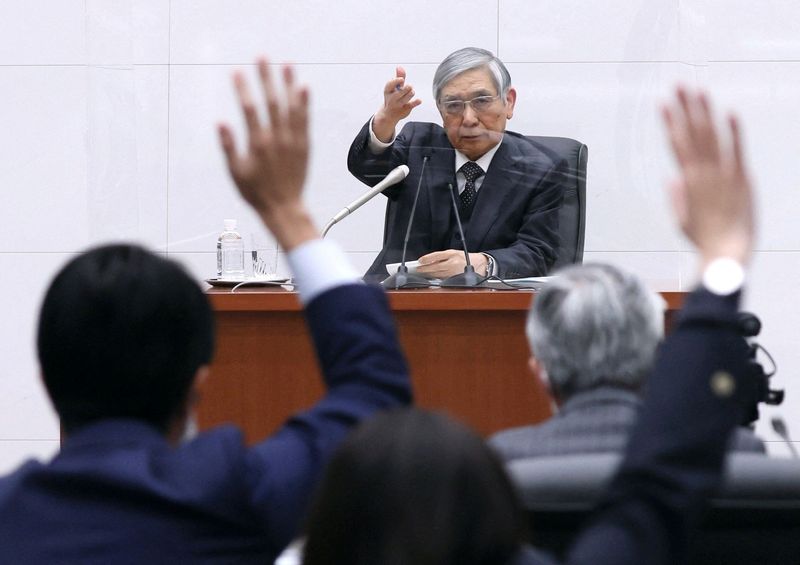By Tom Westbrook
SINGAPORE (Reuters) - The Bank of Japan's decision on Tuesday to adjust its policy band for bond yields, a step it said was aimed at improving market functioning, is instead drawing speculators deeper into betting on bigger changes by the developed world's last dove.
As traders were quietly winding down after a bumpy year, the BOJ decided at its policy review to allow the 10-year bond yield to move 50 basis points either side of its 0% target, wider than the previous 25 basis point band.
It is the largest adjustment in a six-year experiment with so-called yield-curve control (YCC). But rather than providing breathing room, investors say it is likely to encourage more of the sort of pressure that has bent the bond market out of shape.
"We haven't traded Japan today, which just tells you about our position. We're happy to stay short," said Tom Nash, a fixed income portfolio manager at UBS Asset Management in Sydney who holds his position via Japanese government bond futures.
"Fifty basis points becomes the new 25 basis points. We just ratchet up to that level and ask the same questions that we were asking before," he said.
"Knowing that the BOJ is more flexible... I think it tells you that you should stay in these short positions."
Governor Haruhiko Kuroda made clear that the move was meant to iron out market distortions, and that it was "not an interest rate hike" and "not a review that will lead to an abandonment of YCC or an exit from easy policy."
Yet markets, where price moves have pointed to bets on a bigger policy shift steadily building for months, took it as a signal that the groundwork for change is being prepared.
The Japanese yen, which has been gaining for weeks, partly on mounting speculation of some kind of shift from the BOJ, rose sharply against the U.S. dollar after the policy announcement, which came during markets' lunch break in Tokyo.
When trading resumed in Japan, 10-year JGB yields shot towards their new ceiling and futures fell so fast it triggered a circuit breaker suspending trade.
By the end of the session, 10-year bond yields sat 14.5 basis points higher at 0.395%, the sharpest one-day rise for Japanese 10-year yields in more than 14 years.
Yields across the curve moved up too, though by smaller increments, and interest rate swaps, which had also been moving in anticipation of an eventual exit from easy policy, spiked, with 10-year swaps at a nine-year high of 87 bps.
Those swaps - another market measure of interest rate expectations - tracked bond yields until early this year.
WIDOWMAKER
Japan has become ever more of an monetary policy outlier this year as inflation has forced every other big central bank to stop buying bonds and start tightening, and it has been openly challenged by investors.
Defending the yield target has required so much bond buying that the BOJ's holdings have topped half of all the Japanese government bond market, according to a report it issued on Monday.
It the first time that the figure has exceeded 50%, according to Yasunari Ueno, chief market economist at Mizuho.
Because Tuesday's shift came with a fresh promise of increased bond buying to defend its new band, market participants do not think it will solve functionality issues.
"That's the underlying problem. This change is inadequate," said UBS's London-based strategist James Malcolm.
"YCC now sits atop the economy like a bad toupee, and will most likely be abandoned fully by April, if not January."
To be sure though, a wider band - at least initially - can let bond trade flow a little more naturally, while the rallying yen will take some heat out of the economic drag that higher import costs puts on Japanese households and manufacturers.
"The change in YCC range will help reduce the bond market from being artificially held up by central bank bond purchases, and improve secondary trading liquidity," said Kheng Siang Ng, Asia-Pacific fixed income head at State Street (NYSE:STT) Global Advisors.
But he added that it signals the beginning of the end of ultra-low interest rates in Japan, and probably a bumpy exit.
"As investors further assess the implications," he said, "the market may stay volatile for the coming weeks."
